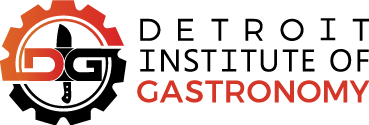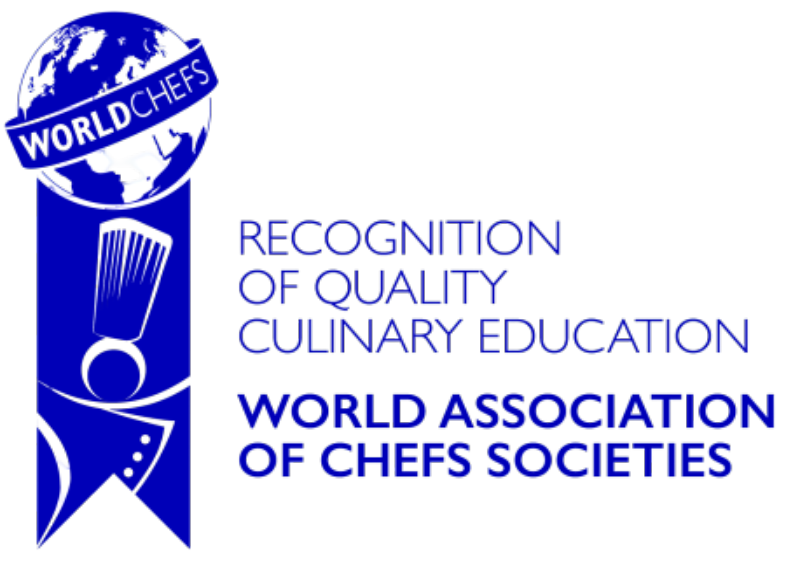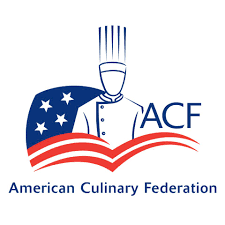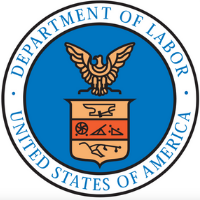- CODE TYPE CREDIT
- CUL 1010 (OJL) 6 Culinary Foundation I
- CUL 1011 (LC) 3 Sanitation and Safety
- CUL 1012 (LC) 3 Introduction to Food Service
- CUL 1020 (OJL) 6 Culinary Foundation II
- CUL 1021 (LC) 3 Food Preparation Theory I
- CUL 1030 (OJL) 6 Culinarian I
- CUL 1040 (OJL) 6 Culinarian II
- CUL 2050 (OJL) 6 Sous Chef I
- CUL 2051 (LC) 3 Food Preparation Theory II
- CUL 2052 (LC) 1 ACF Practical Exam Preparation
- CUL 2060 (OJL) 6 Sous Chef II
- CUL 2061 (LC) 3 Garde Manger Theory
- CUL 2070 (OJL) 6 Sous Chef III
- CUL 2072 (LC) 3 Food Cost Accounting
- CUL 2080 (OJL) 6 Sous Chef IV
- CUL 2081 (LC) 3 Baking Fundamentals Theory
- CUL 2082 (LC) 3 Pastry Fundamentals Theory
- HOS 1022 (SP) 3 Nutrition/Allergens
- HOS 2071 (LC) 3 Menu Planning
- MAT 1031 (LC) 3 Fundamentals of Math - Purchasing and Receiving
- ENG 1032 (LC) 3 Composition I – Hospitality Icons
- ENG 1062 (LC) 3 Composition II - Supervisory Management Theories
- HUM 1052 (LC) 3 Humanities and Culture – Service Culture in Hospitality
- HIS 2053 (LC) 3 World Civilizations I – Food Systems Development and Culture
- HIS 2054 (LC) 3 World Civilizations II – Service Culture in Hospitality
- ENG 2062 (LC) 3 Professional Communication
- IND 2090 (OJL IND) 1 Independent Study
CODE TYPE CREDIT #
CUL 1010 (OJL) 6 Culinary Foundation I #
This OJL course provides the student with actual hands-on-working experience and academic study allowing them to both learn and demonstrate their skills in a live kitchen environment. Course work is instructor led while under the direct supervision of the sponsoring food service operation and course instructor. Guidance and supervision are the key to a successful apprenticeship. The student will be immersed in the professional kitchen environment. In the kitchen the student’s focus will be directed to tools and equipment identification, knife skills, mise en place, ingredient measuring, recipe conversions, food preparation techniques and proper food storage. In the online course work, the student is presented the foundations of food production management and the systems of supervising daily operations. This interactive course includes an orientation to the program and the student’s apprenticeship site as well as on-the-job training. Documentation of hours is required.
CUL 1011 (LC) 3 Sanitation and Safety #
Explore the science behind food safety and learn the global standards for food service. Students will be educated in personal hygiene, food protection from agriculture to service. Understand pathogens that are of high risk to food and methods to reduce the risk to the consumer. The course will result in multiple industry, globally recognized certifications.
CUL 1012 (LC) 3 Introduction to Food Service #
An introduction to the many sectors of the food service and hospitality industry. This course with expose the student to customer service principles, professional industry associations, trends in the industry and prepare the student to understand the different tasks and responsibilities of a professional kitchen.
CUL 1020 (OJL) 6 Culinary Foundation II #
This OJL course provides the student with actual hands-on-working experience allowing them to both learn and demonstrate their skills in a live kitchen environment under the direct supervision of the sponsoring food service operation and course instructor. Guidance and supervision are the key to a successful apprenticeship. The student will be immersed in the professional kitchen environment. In the online course work, the student is presented the foundations of food production management and the systems of supervising daily operations. The student’s focus will be directed to tools and equipment identification, knife skills, mise en place, ingredient measuring, recipe conversions, food preparation techniques and proper food storage. This interactive course includes an orientation to the program and the student’s apprenticeship site as well as 500 hours of on-the-job training. Documentation of hours is required. Prerequisite: CUL 1010
CUL 1021 (LC) 3 Food Preparation Theory I #
This course will provide students an understanding of the science and methods of dry heat cooking, moist heat cooking and combination cooking. Instruction will include plate composition, flavor development and organizational techniques in operating a professional kitchen task list.
CUL 1030 (OJL) 6 Culinarian I #
Building on Culinary Foundations I and II, this course will focus on expanding exposure to fruits, vegetables, grains, pasta and starches. Culinarian I will provide the student information about hors d’ oeuvres, appetizers, breakfast and more. The final section of the course will further the knowledge of stocks, soups and contemporary sauces. This interactive course includes online education focused on food production management and the systems of supervising daily operations and hands on experience with the student’s apprenticeship site. The course will cover the required hours of on-the-job training. Documentation of hours is required. Prerequisite: CUL 1010 and 1020
CUL 1040 (OJL) 6 Culinarian II #
Preparing both land and water proteins will be explored in depth with a focus on preparing poultry, beef, veal, pork, lamb, whole fish and shellfish. Proper handling, sanitation techniques, and meat terminology will be emphasized. Baking and pastry techniques will be provided in this course along with the opportunity to prepare quick breaks and cookies. This interactive course includes online education focused on food production management and the systems of supervising daily operations and hands on experience with the student’s apprenticeship site. The course will cover the required hours of on-the-job training. Documentation of hours is required. Prerequisite: CUL 1010 and 1020
CUL 2050 (OJL) 6 Sous Chef I #
This course continues to build on the foundational skills and knowledge obtained, the student is now exposed to running a station as well as continuing to learn vegetable, grain, pasta and starch preparations. This interactive course includes online education and hands on experience with the student’s apprenticeship site. Organizational skills, team building, independent learning and critical thinking are practiced in this course. The course will cover the required hours of on-the-job training. Documentation of hours is required. Prerequisite: CUL 1030, CUL 1040
CUL 2051 (LC) 3 Food Preparation Theory II #
This course provides the student to build on and advance the concepts presented in Food Preparation Theory I. Students will have the opportunity to learn contemporary cooking principles and how to maximize flavor development with the use of technology. Students will compare classical cooking principles to modern methods and conduct a comparative analysis to create recipe formulation to be applied to final exams. Prerequisite: CUL 1021
CUL 2052 (LC) 1 ACF Practical Exam Preparation #
This course prepares students for ACF Practical Examinations up to the Certified Chef de Cuisine level. How to approach the exam, preparation techniques and expectations are discussed and analyzed against what has been learned throughout the program. Prerequisite: CUL 1040
CUL 2060 (OJL) 6 Sous Chef II #
The on-the job training will continue with Buffet presentation in this course as well as making classical sauces from scratch and derivative sauces from the classical bases. This interactive course includes online education and hands on experience with the student’s apprenticeship site. Organizational skills, team building, independent learning and critical thinking are practiced in this course. The course will cover the required hours of on-the-job training. Documentation of hours is required. Prerequisite: CUL 1030, CUL 1040
CUL 2061 (LC) 3 Garde Manger Theory #
Since the development of agricultural systems, food preservation and theories of garde manger have been applied to food. The student will learn the theories and techniques of the garde manger kitchen and how to enhance flavors through methods of preservation, utilization and optimization of materials as they relate to the cold production areas of an operation.
CUL 2070 (OJL) 6 Sous Chef III #
Advanced cooking techniques and flavor development concepts for proteins including poultry, beef, pork, lamb, veal, fish and shellfish are covered in this course. The student will prepare a variety of composed dishes building on the knowledge gained. This interactive course includes online education and hands on experience with the student’s apprenticeship site. Organizational skills, team building, independent learning and critical thinking are practiced in this course. The course will cover the required hours of on-the-job training. Documentation of hours is required. Prerequisite: CUL 1030, CUL 1040
CUL 2072 (LC) 3 Food Cost Accounting #
This course provides students insight into profit and loss statements, budgeting and projecting for financial success in the hospitality industry. Methods to reduce fixed and variable costs will be analyzed and compared using case studies from the industry. Using accounting concepts outlined in this course, the student will create a financial plan for a restaurant operation in the modern food service industry that is profitable and applicable. Prerequisite MAT 1031
CUL 2080 (OJL) 6 Sous Chef IV #
The student will build on the baking and pastry foundation acquired and prepare, yeast breads, pies and tarts as well as preparing cakes and icing. The student will prepare a variety of composed dishes building on the knowledge gained. This interactive course includes online education and hands on experience with the student’s apprenticeship site. Organizational skills, team building, independent learning and critical thinking are practiced in this course. The course will cover the required hours of on-the-job training. Documentation of hours is required. Prerequisite: CUL 1030, CUL 1040.
CUL 2081 (LC) 3 Baking Fundamentals Theory #
The fundamentals of the bakeshop will be taught from ingredient functionality and production techniques to packaging and sales. Classifications of yeast dough, chemical leavened, savory and sweet products will be explored as well as how to produce. Equipment, tools and other unique ingredients to the bakeshop will be taught.
CUL 2082 (LC) 3 Pastry Fundamentals Theory #
Classical and modern pastries will be explored and studied. Students will gain an understanding of the unique products, ingredients and techniques required to work in a pastry kitchen. Students will develop and understanding of the techniques and methods that can be applied to the savory kitchen while comparing those that cannot.
HOS 1022 (SP) 3 Nutrition/Allergens #
The student will gain education in nutrition science that is critical to the foodservice industry. Human nutritional needs, special diets, allergens and the safety of them will be taught. An understanding of health and wellness and how to deliver full flavor and delicious food while meeting nutritional requirements will be taught. Recipe manipulation and functionality of ingredients will be discussed.
HOS 2071 (LC) 3 Menu Planning #
Menu planning and seasonality in agriculture systems will be covered and applied to how they affect the hospitality industry. Menu mix and how it relates to finances and customer perceptions will be analyzed against industry trends. Concepts of SWOT and PEST Analysis will be discussed in the relation to planning a menu to meet and exceeds operational goals. Prerequisite: MAT 1031, ENG 1032
MAT 1031 (LC) 3 Fundamentals of Math – Purchasing and Receiving #
Fundamentals of math will be delivered while the student learns the importance of purchasing and receiving for the hospitality industry. Basics of recipe formulation, conversations, yields, par levels and financials will be discussed. Fundamentals of food costing, As Purchased and Edible Purchased concepts are introduced.
ENG 1032 (LC) 3 Composition I – Hospitality Icons #
The multistage writing process will be covered using student selected materials focused on hospitality industry icons and influencers. Students will read, analyze and write essays to demonstrate competencies as they relate to composition.
ENG 1062 (LC) 3 Composition II – Supervisory Management Theories #
This course is focused on the theories of supervisory management, students will research, develop and write persuasive and argumentative papers. Critical thinking and logical reasoning will be applied to writing a documented research paper based on supervisory management theories common in hospitality systems. Prerequisite ENG 1032
HUM 1052 (LC) 3 Humanities and Culture – Service Culture in Hospitality #
The students will investigate the service culture in the hospitality industry and the influence it has on American society and culture. The development of service in both food and beverage will be critiqued by the student in relation to culture, diversity, and the socioeconomics of the service industry. Developments in gastronomy from the first century to modern day will be studied. Arranged thematically rather than chronologically, the class takes a broad look at humanities and culture in and through the hospitality industry. Prerequisite: ENG 1032
HIS 2053 (LC) 3 World Civilizations I – Food Systems Development and Culture #
Students will explore cultural, social, religious, economic and political institutions traced through the development of agriculture in human society. Comparative analysis will outline and illustrate the changes in human diversity, development and the cultural impacts food systems have had from the origins of man to modern day civilizations. Prerequisite: ENG 1032
HIS 2054 (LC) 3 World Civilizations II – Service Culture in Hospitality #
Expanding on the analytical comparisons of agricultural development, the students will investigate the service culture in the hospitality industry and the influence it has on American society. The development of service in both food and beverage will be critiqued by the student in relation to culture, diversity and the socioeconomics of the service industry. Prerequisite: HIS 2053
ENG 2062 (LC) 3 Professional Communication #
This course will focus on communication skills (writing, speaking, reading, listening) for career-oriented fields. Students will be provided an opportunity to use critical thinking skills and technology to analyze, design, produce, and present written projects. Projects (detailed descriptions, directions, process analysis, memos, letters, proposals, summaries, instructions) will be career-oriented and focus on communication within a professional food production operation.
IND 2090 (OJL IND) 1 Independent Study #
This OJL course provides the student with additional hands-on-working experience allowing them to learn and demonstrate their skills in a live kitchen environment under the direct supervision of the sponsoring food service operation and course instructor. Guidance and supervision are the key to a successful apprenticeship. This interactive course builds on the student’s live practical application of culinary skills while working to meet the U.S. DOL OJL 4000 minimum apprenticeship hours of on-the-job training required for graduation. Documentation of hours is required. Students who take this course must have a minimum cumulative GPA of 2.0 and prior approval of the Culinary Arts Program Director. This course is offered as credit/no credit only. Prerequisite: CUL 2080.





